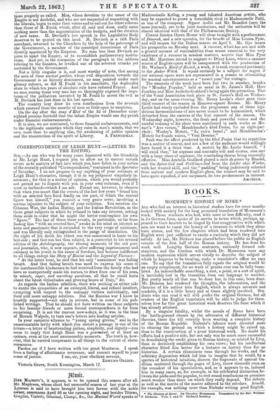CORRESPONDENCE OF LEIGH HUNT:—(LETTER TO THE EDITOR).
SIB,—As one who was for many years honoured with the friendship
of Mr. Leigh Hunt, I request you to allow me to correct certain errors as to matters of fact into which you have fallen in your notice of the recently published "Correspondence," contained in the Spectator of Saturday. I do not propose to say anything of your estimate of Leigh Hunt's character, though it is in my judgment singularly in- accurate ; for that is a matter of opinion, winch you would probably not permit me to dispute with you in your own columns, even if I were so inclined—which I am not. Permit me, however, to observe that when you assert that the events of the last few years "found him with an averted face fixed fondly on the past, of which the central figure was himself," you commit a very grave error, involving a serious injustice to the subject of your criticism. You mention the Crimean War, the Indian Mutiny, and the Italian Revolution, as the three great subjects in which he refused to take any interest, setting them aside in order that he might the better contemplate his own " figure." The last of those three events, in particular, so far from finding him "with an averted face," awoke in his mind an interest so keen and passionate that it extended to the very verge of existence, and was literally only extinguished in the pangs of dissolution. On the night of his death his eldest sou was summoned in haste to his bed-side ; and that son has thus related, in a postscript to his revised edition of the Autobiography, the closing moments of the old poet and journalist, who, it now appears, after suffering imprisonment and calumny in his youth in the cause of freedom, had become indifferent to all things except the Story of Bimini and the Legend of Florence: " At the latest hour, he said that his only ` uneasiness' was failing breath. And that failing breath was used to express his sense of the inexhaustible kindnesses he had received from the family who had been so unexpectedly made his nurses, to draw from one of his sons, by minute, eager, axd searching questions, all that he could learn about the latest vicissitudes and growing hopes of Italy," &c. As regards the Indian rebellion, there was nothing on either side to excite the sympathies of an enlarged, liberal, and refined intellect, excepting with respect to the unhappy victims individually, and their still more unhappy relatives. But the Russian war I know he heartily supported—not only in private, but in some of his pub- lished writings. That he should not have written on these subjects to his familiar friends or more formal correspondents is far from surprising. It is not the custom now-a-days, as it was in the time of Horace Walpole, to turn one's letters into leading articles. In your sarcastic allusion to "young spring greens," and in the unaccountable levity with which you distort a passage in one of the letters—a letter of heartrending pathos, simplicity, and dignity—you seem to imply that Leigh Hunt was a gourmand, or at least an epicure, even at the most unseasonable moments. The truth is, how- ever, that he carried temperance in all things to the extent of abste- miousness.
Pardon me if I have written with too great bluntness. I speak from a feeling of affectionate reverence, and commit myself to your
sense of justice. I am, sir, your obedient servant,
EDMUND OLLIE&
Victoria Grove, South Kensington, March 17.






























 Previous page
Previous page